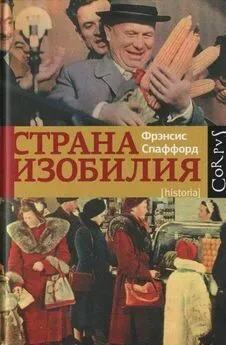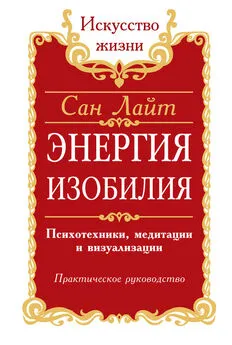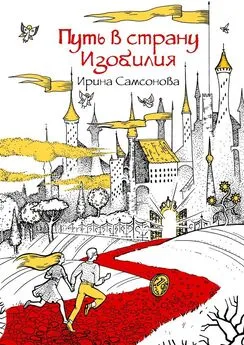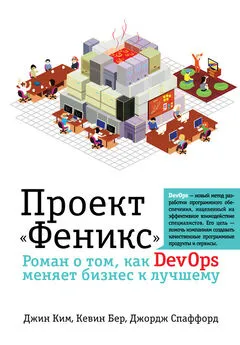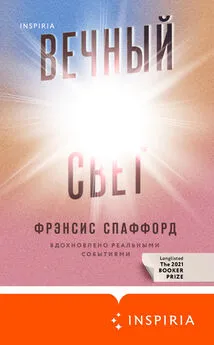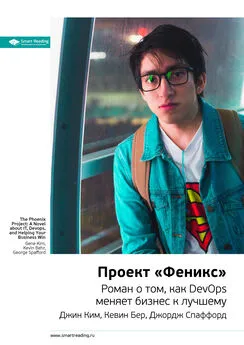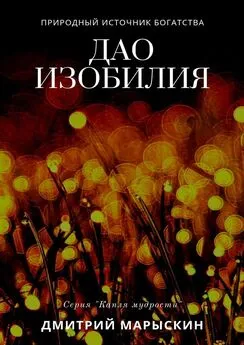Фрэнсис Спаффорд - Страна Изобилия
- Название:Страна Изобилия
- Автор:
- Жанр:
- Издательство:Астрель
- Год:2012
- ISBN:нет данных
- Рейтинг:
- Избранное:Добавить в избранное
-
Отзывы:
-
Ваша оценка:
Фрэнсис Спаффорд - Страна Изобилия краткое содержание
Фрэнсис Спаффорд не без иронии называет свою книгу “Страна Изобилия” сказкой. Сказкой про то, что вот-вот должно было стать былью. Это история про Советский Союз, каким он был в конце пятидесятых — начале шестидесятых годов, при Хрущеве. В ту пору советский народ, взяв на вооружение плановую экономику, шагал к изобилию и процветанию и через пару десятков лет должен был, как обещали руководители государства, прийти к коммунизму. Американская выставка в Сокольниках, создание академгородка в Новосибирске, поездка Хрущева в США, расстрел демонстрации в Новочеркасске — все эти события описаны с удивительной точностью, но это не сухое описание, а живой рассказ, в котором действуют и реальные, и вымышленные персонажи — партийные деятели и энтузиасты-комсомольцы, ведущие ученые и простые рабочие.
Страна Изобилия - читать онлайн бесплатно полную версию (весь текст целиком)
Интервал:
Закладка:
— Planning Problems in the USSR: The Contribution of Mathematical Economics to Their Solution 1960–1971. Cambridge: CUP, 1973
— Seven Theses on Kosyginism, Collectivism, Convergence and Capitalism. London: Harcourt Brace, 1984
Michael Ellman and Vladimir Kontorovich, eds. The Destruction of the Soviet Economic System: An Insiders History. Armonk NY: M. E. Sharpe, 1998
Robert English. Russia and the Idea of the West: Gorbachev, Intellectuals and the End of the Cold War. New York: Columbia University Press, 2000 A. P. Ershov. The British Lectures. Heyden: The British Computer Society, 1980
Orlando Figes. Natashas Dance: A Cultural History of Russia. London: Allen Lane, 2002
— The Whisperers: Private Lives in Stalins Russia. London: Allen Lane, 2007 Sheila Fitzpatrick. Tear Off the Masks! Identity and Imposture in Twentieth-Century Russia. Princeton NJ: Princeton University Press, 2005
— Everyday Stalinism.OUP, Oxford, 2000
— Education and Social Mobility in the USSR 1921–1934. Cambridge: CUP, 1979
Robert Freedman, ed. Marx on Economics. New York: Harcourt Brace, 1961; Harmondsworth: Pelican, 1962
Alexander Galich. Dress Rehearsal: A Story in Four Acts and Five Chapters. Transl Maria R Bloshteyn. Bloomington IN: Slavica, 2007
Songs and Poems. Ed and transl Gerald Stanton Smith. Ann Arbor MI: Ardis, 1983; особ. см. биографическое предисловие Silence is Connivance: Alexander Galich, pp. 13-54
Saul I. Gass. Linear Programming: Methods and Applications. NewYork: McGraw-Hill. 4th edn, 1975
James von Geldern and Richard Stites, eds. Mass Culture in Soviet Russia. Tales, Poems, Songs, Movies, Plays and Folklore 1917–1953, Bloomington IN: Slavica, 1995
Slava Gerovitch. From Newspeak to Cyberspeak. Boston: MIT Press, 2002
Nikolai Gogol. Dead Souls. Transl. Richard Pevear and Larissa Volokhonsky. New York: Pantheon Books, 1996
Loren R. Graham. Science and Philosophy in the Soviet Union. New York: Alfred A. Knopf, 1972
Seth Benedict Graham. A Cultural Analysis of the Russo-Soviet Anekdot. PhD thesis, University of Pittsburgh, 2003 Paul R. Gregory and Robert C. Stuart. Russian and Soviet Economic Performance and Structure. 6th edn. Reading MA: Addison-Wesley, 1998 Jukka Gronow. Caviar with Champagne: Common Luxury and the Ideals of the Good Life in Stalins Russia. Oxford: Berg, 2003
Gregory Grossman, ed. Value and Plan: Economic Calculation and Organization in Eastern Europe. Berkeley CA: University of California Press, i960
Vasily Grossman. Forever Flowing. Transl Thomas R Whitney. New York: Harper amp; Row, 1972
Life and Fate. Transl Robert Chandler. London: Harvill, 1995
P. Charles Hachten. Property Relations and the Economic Organization of Soviet Russia, 1941 to 1948: Volume One. PhD thesis. University of Chicago, 2005
Mike Hally. Electronic Brains: Stories from the Dawn of the ComputerAge. London: Granta, 2005
John Pearce Hardt, ed. Mathematics and Computers in Soviet Economic Planning. New Haven CT: Yale University Press, 1967 Robert L. Heilbroner. The Worldly Philosophers: The Lives, Times and Ideas of the Great Economic Thinkers. 4th edn. New York: Simon and Schuster, 1971
Jochen Hellbeck. Revolution on My Mind: Writing a Diary Under Stalin. Cambridge MA: Harvard University Press, 2006 Fiona Hill and Clifford Gaddy. The Siberian Curse: How Communist Planners Left Russia Out in the Cold. Washington DC: Brookings Institution Press, 2003
Walter Hixson. Parting the Curtain: Propaganda. Culture and the Cold War, 194^-1961. New York: St Martins Press, 1997
Geoffrey M. Hodgson. Economics and Utopia: Why the learning economy is not the end of history. London: Routledge, 1999 Mark Holborn and Torsten Nystrom, eds. Propaganda: Photographs Emm Soviet Archives. Chichester: Bonnier Books, 2007 Franklyn D. Holzman, ed. Readings on the Soviet Economy. Chicago: Rand-McNally, 1962 '
Yvonne Howell. Apocalyptic Realism: The Science Fiction of Arkady and Boris Strugatsky. New York, 1994
Ilya Ilf and Yevgeny Petrov. The Twelve Chairs. Transl John H. C. Richardson. Evanston IL: Northwestern University Press, 1997
In Little Golden America. Transl Charles Malamuth. New York: Farrar amp; Rinehart, 1937
Paul R. Josephson. Hew Atlantis Revisited: Akademgorodok, the Siberian City of Science. Princeton NJ: Princeton University Press, 1997 Tony Judt. Postwar: A History of Europe Since 1945. London: William Heinemann, 2005
Daniel Kalder. Lost Cosmonaut: Travels to the Republics That Tourism Forgot. London: Faber, 2006
L. V. Kantorovich. The Best Use of Economic Resources. Transl R F. Knightsfield. Oxford: Pergamon Press, 1965
— 1975 Nobel Prize autobiography. Assar Lindbeck, ed. Nobel Lectures. Economics 1969–1980. Singapore: World Scientific Publishing Co., 1992 Simon Kassel. Soviet Cybernetics Research: A Preliminary Study of Organisations and Personalities. RAND Corporation report R-909-ARPA. Santa Monica CA, December 1971
Vladimir Katkoff. Soviet Economy 1940-196j. Baltimore MD: Dangary, 1961
Aron Katsenelinboigen. Soviet Economic Thought and Political Power in the USSR. New York: Pergamon, 1980
Catriona Kelly. Reining Russia: Advice Literature, Polite Culture and Gender from Catherine to Yeltsin. Oxford: OUP, 2001 Nikita Khrushchev. Khrushchev Remembers. Little Brown, Boston, 1970
Khrushchev Remembers: The Glasnost Tapes. Ed. and transl. Jerrold V Schecter and Vyacheslav V Luchkov. Boston MA: Little Brown, 1990 Sergei Khrushchev. Khrushchev on Khrushchev: An Inside Account of the Man and His Era. Ed and transl William Taubman. Boston MA: Little Brown, 1990
Khrushchev in America: Full Texts of the Speeches Made by N. S. Khrushchev on His Tour of the United States. September 15–27, 1959. New York: Crosscurrents Press, i960
Danilo Kis. The Magic Card Dealing. A Tomb for Boris Davidovich. Trans, anonymously from the Serbian. New York: Harcourt Brace Jovanovich, 1978 Leszek Kolakowski. Main Currents of Marxism: The Founders, the Golden Age, the Breakdown. Transl R S. Falla. London: OUP, 1978; one-volume edition New York: W W Norton, 2005, p. 219–226 Janos Kornai. Anti-Equilibrium. Amsterdam, 1971
Economics of Shortage, vol. A. Amsterdam/Oxford/New York, 1980
Preface to Second Hungarian Edition in Overcentralization in Economic Administration: A Critical Analysis Based on Experience in Hungarian Light Industry. OUR 1994, pp. xii-xxv
Stephen Kotkin. Steeltown. USSR: Soviet Society in the Gorbachev Era. Berkeley CA: University of California Press, 1991
Magnetic Mountain: Stalinism as a Civilization. University of California Press, 1995
Armageddon Averted: The Soviet Collapse, 1970–2000. Oxford: OUR 2001 Maria Kravchenko. The World of the Russian Fairy Tale. Berne, 1987 Alena Ledeneva. Russias Economy of Favours: ВЫ, Networking and Informal Exchange. Cambridge: CUR 1998
Wassily Leontief. Essays in Economics: Theories and Theorizing. New York: OUP, 1966
Let Us Live in Peace and Friendship: The Visit of N S Khrushchov to the USA, Sept 15–27,1959. Moscow: Foreign Languages Publishing House, 1959 Moshe Lewin. Political Undercurrents in Soviet Economic Debates: From Bukharin to the Modem Reformers. Princeton NJ: Princeton University Press, 1974
The Soviet Century. London: Verso, 2005
R. B. McKean. St Petersburg Between the Revolutions: Workers and Revolutionaries. New Haven CT: Yale University Press, 1990 Ken Macleod. The Cassini Division. London: Legend, 1998 Janet Malcolm. Reading Chekhov: A Critical Journey. New York: Random House, 2001
Boris Nikolaevich Malinovsky. Pioneers of Soviet Computing. Ed Anne Fitzpatrick. Transl Emmanuel Aronie. www.sovietcomputing.com Фрэнсис Спаффорд Страна Изобилия Francis Spufford Red Plenty Перевод с английского Анны Асламян М.: Астрель: CORPUS, 2012. — 512 с. ISBN 978-5-271-42086-3 Художественное оформление и макет Андрея Бондаренко Издание осуществлено при техническом содействии издательства ACT Главный редактор Варвара Горностаева Художник Андрей Бондаренко Ведущий редактор Вера Пророкова Научный редактор Александр Нотченков Ответственный за выпуск Мария Косова Технический редактор Татьяна Тимошина Корректор Любовь Петрова Верстка Елена Илюшина Фрэнсис Спаффорд не без иронии называет свою книгу “Страна Изобилия” сказкой. Сказкой про то, что вот-вот должно было стать былью. Это история про Советский Союз, каким он был в конце пятидесятых — начале шестидесятых годов, при Хрущеве. В ту пору советский народ, взяв на вооружение плановую экономику, шагал к изобилию и процветанию и через пару десятков лет должен был, как обещали руководители государства, прийти к коммунизму. Американская выставка в Сокольниках, создание академгородка в Новосибирске, поездка Хрущева в США, расстрел демонстрации в Новочеркасске — все эти события описаны с удивительной точностью, но это не сухое описание, а живой рассказ, в котором действуют и реальные, и вымышленные персонажи — партийные деятели и энтузиасты-комсомольцы, ведущие ученые и простые рабочие.
Terry Dean Martin. The Affirmative Action Empire: Nations and Nationalism in the Soviet Union, 1923–1939. Ithaca NY: Cornell University Press, 2001
Frank J. Miller. Folklore for Stalin: Russian Folklore and Pseudo-folklore of the Stalin Era. Armonk: M. E. Sharpe, Inc., 1990
Philip Mirowski. Machine Dreams: Economics Becomes a Cyborg Science. Cambridge: CUP 2002
Ludwig von Mises. Socialism, 1922. Transl J. Kahane. Indianapolis: Liberty Fund, 1981
Nikolai Nekrasov. Who Can Be Happy and Free in Russia? Transl Juliet M Soskice, London, 1917
V. S. Nemchinov, ed. The Use of Mathematics in Economics. Edinburgh: Oliver amp; Boyd, 1964
Alec Nove. The Soviet Economic System. London: Allen amp; Unwin, 1986
Economic History of the USSR, 1917–1991. London, 1992
V. V. Novozhilov. Problems of Cost-Beneft Analysis in Optimal Planning. Transl H. McQuiston. White Plains NY, 1970
Marshall T. Poe. The Russian Moment in World History. Princeton NJ: Princeton University Press, 2003
Karl Polanyi, The Great Transformation: The Political and Economic Origins of Our Time. Boston MA: Beacon Press, 2001 Karl Popper. The Open Society and Its Enemies. London, 1945 Paul Craig Roberts. Alienation and the Soviet Economy. Albuquerque: University of New Mexico Press, 2002
Kim Stanley Robinson. The Gold Coast. New York: Tor, 1988
Mark Robson and William Toscano. Risk Assessment for Environmental Health. San Francisco: Wiley, 2007; pp. 69–77.
Eli Rubin. Synthetic Socialism: Plastics and Dictatorship in the German Democratic Republic. Chapel Hill NC: University of North Carolina Press, 2009 Leonard Schapiro, ed. The USSR and the Future: An Analysis of the New Program of the CPSU. New York: Institute for the Study of the USSR/Frederick A. Praeger Inc., 1963
Читать дальшеИнтервал:
Закладка:
